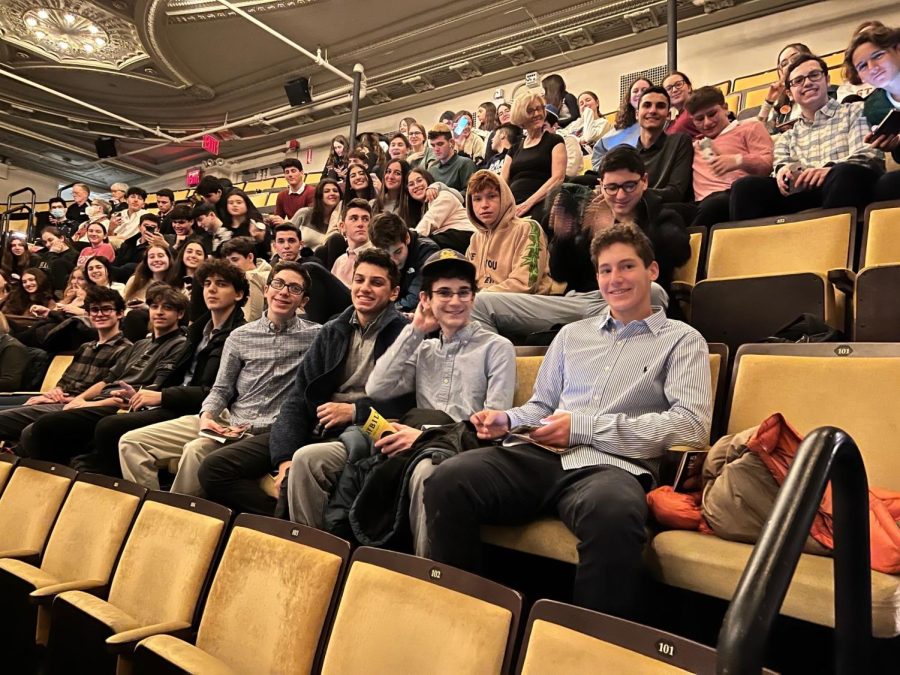To Require Or Not to Require- The Relationship Between Ramaz Students and Live Theater
Ramaz is located in the heart of Manhattan. As advertised in the admissions catalog, the school strives to show students, especially those whose families are impartial to the arts, the vast spectrum of New York City culture and entertainment. However, many, especially those who came to Ramaz during the Covid years, have not experienced school-sponsored outings until recently. “Due to Covid, which resulted in theater houses being closed, and other factors, we have taken fewer students to see shows,” says Ms. Litwack, chair of the English department. “We are working on increasing out-of-classroom experiences, and so far this semester I have taken my senior honors English class to see Topdog/Underdog, my Senior Escape from the Self course to a performance of Leopoldstadt, and coordinated the 11th-grade trip to see Death of A Salesman on Broadway.”
“It’s a very different experience [to see a performance live]. I grew up in a tiny town in New England and the first time I saw live theater was at a Shakespearean troupe at my high school. It was such a revelation to me. It was so exciting and I enjoyed it so much. The people are real. It gives a whole other dimension to the play,” says Dr Honig, who requires students to memorize lines/scenes from the plays discussed in class. Although some students dislike this added homework assignment, Dr. Honig attests to the fact that memorizing lines from famous Shakespeare plays is a unique experience that allows students to better understand what they are reading.
The Junior Death of A Salesman trip took place during school hours. Students were missing class, a positive occurrence in the mind of a traditional high schooler. According to teachers who chaperoned, some students left after the first half of the play, if they even came at all. Ms. Litwack, who had taken groups of students to see Death of Salesman twenty years ago, has noticed a real shift in students’ behavior and attitude towards live theater. “They used to be more excited about going, it was a privilege. When we went to the theater they knew how to act respectfully. Of course there have always been outliers, but the groups behaved well overall. Students forget that the actors on stage are real people who can see into the audience. If you are on your smartphone or chatting loudly with your friend, it can interrupt their concentration.” Ms. Litwack attributes this change in attitude to the decrease in attention span of today’s youth due to technology and a general culture shift of teenagers desiring constant entertainment. For plays moving forward, Ms. Litwack is working to organize individual classes, rather than entire grade outings, to see shows. She hopes this will curb behavioral issues while simultaneously increasing students’ engagement in what they are seeing due to the experience being more directly connected to their courses.
Do all students see this uptick in school-mandated events as positive? “I believe the school shouldn’t take us to more plays but should provide us with more opportunities to visit them outside of class,” says Alisa Gleyzer ’23, who has recently attended a night showing of the famous opera Rigoletto at Lincoln Center with Dr. Tugendhaft and other students. “Some high schoolers are not very interested in plays or musicals, so spending money to take them to shows wouldn’t be beneficial. Instead, I believe that having an outing once in a while where the school provides tickets for those that are interested would be nice.” Dr. Tugendhaft, History Department Chair and Director of Interdisciplinary Programs, has recently started organizing student groups to attend outside-of-school-hours performances for those interested. That way, agreeing with Alisa’s point, those who want to go may go, and those who are utterly uninterested will not be forced to attend.
The question remains whether it is beneficial to require students to attend live shows.” I think it’s important because plays are not only interesting and enjoyable, but they teach us how to act in society. I learned how to be respectful in a public setting and showed a good representation of Ramaz as a whole,” says Simmy Shatzkes ’24, who hopes to attend more grade-wide outings in the future. Just as writing essays, showing up to class, and handing in homework are required components for grading, perhaps attending performances mandated by a teacher should be factored into grades. Time will tell how the Ramaz administration attemps to handle this issue.





